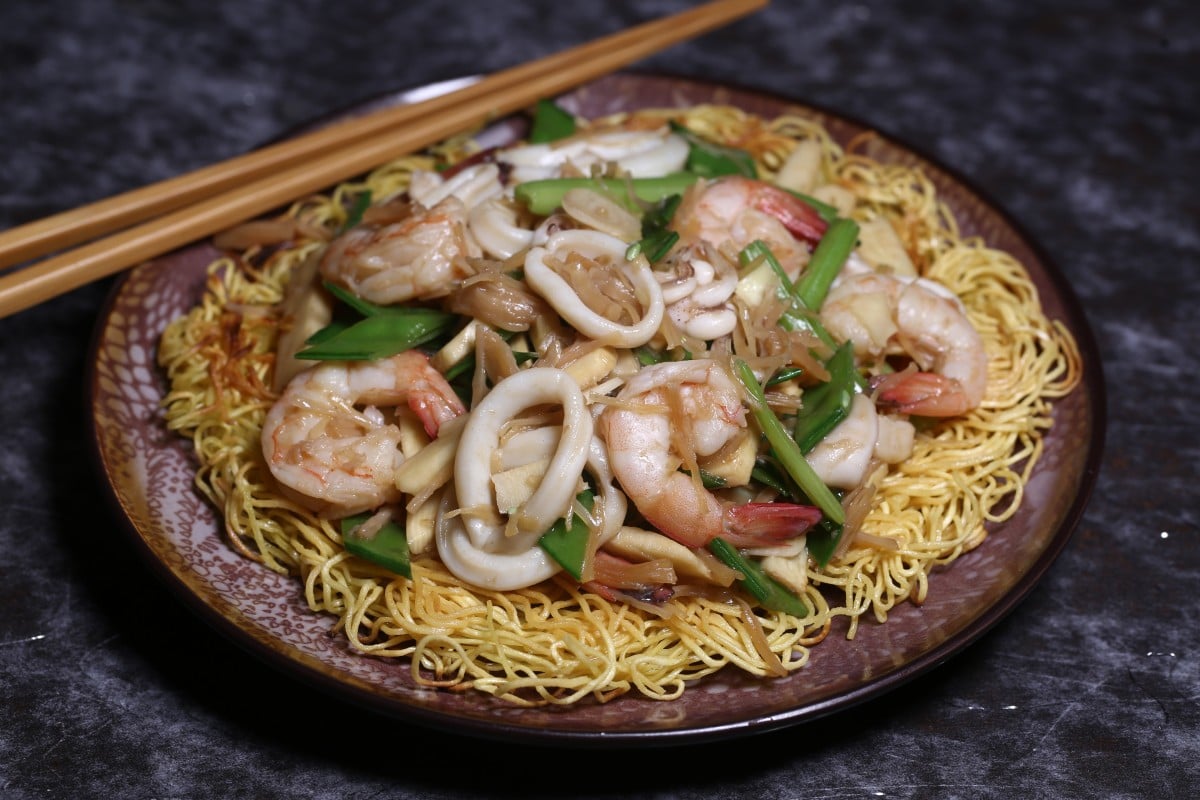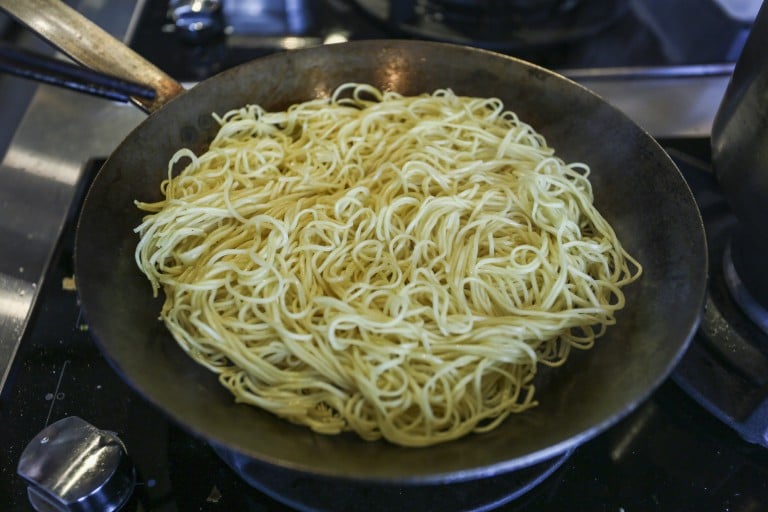
There are many ways to make chow mein (“stir-fried noodles”). Some restaurants serve a basic version – just boiled noodles mixed with seasonings (this is actually lo mein) – while others toss the noodles into a wok and stir-fry them with other ingredients. Sometimes, the noodles are deep-fried. This recipe is for the type you can find at many Hong Kong restaurants - the boiled, drained noodles are pan-fried, which gives them a delicate crispness.
Use fresh egg noodles for this - not too thick and not too thin.
Conpoy - dried scallops - can be difficult to find, so if they are unavailable, leave them out.
Peeled fresh bamboo shoots are often available in the frozen vegetable section of Asian supermarkets. Fresh peeled water chestnuts are often available in the fresh vegetable section of Asian supermarkets.
You can sometimes find fresh prepared (cleaned) squid and peeled fresh shrimp in supermarkets. If you like, use these - it will save a little time.
Briefly rinse the dried scallops under running water, then put them in a bowl, add 200ml (¾ cup plus 1tbsp) of boiling water and leave to soak until fully hydrated.
Bring a large pot of water to the boil and add the noodles. Use chopsticks to pull apart the noodles, separating them into strands. Cook until al dente, then drain and divide into four portions.

Heat an 18cm (7in) skillet over a medium flame, then pour in oil to a depth of about 5mm (¼ in). Put one portion of the noodles into the skillet, spreading them out so they are evenly distributed in the pan in a loose, flat cake. Pan-fry the noodles over a medium-low flame until crisp and lightly browned, pressing with a metal spatula to compress them slightly. If needed, drizzle in more oil around the perimeter of the pan, tilting the skillet so it flows under the noodles. Flip the noodle cake over and fry the other side until crisp and lightly browned, adding oil as necessary. Slide the noodle cake onto a plate. Cook the remaining noodles the same way.
Clean the squid. Pull the tentacles straight out of the body, which will remove most of the innards. Pull the quill and remaining innards out of the body, then rinse it inside and out with running water. Pull off and discard the tough, purplish membrane from the body. Cut the body into rings about 5mm (⅙in) thick. Cut the tentacles from the face and beak. Dry the squid rings and tentacles with paper towels.
Peel the shrimp and cut off the heads. (Reserve the shells and heads to make shrimp stock or shrimp oil.) Cut a slit down the back of the shrimp and remove and discard the vein.
Strain the conpoy through a fine sieve placed over a measuring cup and press on the scallops to extract as much liquid as possible. Reserve the soaking liquid. Pull the conpoy into thin shreds. You should have 150ml (⅔ cup) of soaking liquid; if there’s not enough, add some water. Add the oyster sauce, fish sauce, sugar and pepper to the soaking liquid and stir until dissolved. (If you're not using conpoy, add the seasonings to 150ml (⅔ cup) of plain water.)
Cut the snow peas on the diagonal into 1cm (7/16in) pieces. Peel the water chestnuts and rinse them thoroughly, then slice about 3mm (⅛in) thick. Cut the Chinese celery and spring onions into 3cm (1¼in) lengths.
If using whole bamboo shoots, remove the thick husk to expose the flesh then trim off and discard the woody base. Slice the bamboo about 3mm (⅛in) thick, then cut into pieces about 1cm (7/16in) wide. Bring a pot of water to the boil, add the bamboo shoots and simmer for five minutes. Drain the bamboo shoots.
Mix the cornstarch with 40ml (¼ cup and 1tbsp) of water.
Heat a wok over a high flame and pour in about 15ml (1tbsp) of oil. When the oil is hot, add the bamboo shoots and stir-fry for a couple of minutes. Add the snow peas and celery and stir-fry for about a minute, then mix in the spring onions and cook for about 30 seconds. Take the ingredients from the wok.
Place the wok back over a high flame and add about 15ml (1tbsp) of oil. When the oil is hot, add the shrimp and stir-fry until they curl up and turn pink. Add the cooked vegetables back to the wok, then stir in the shredded conpoy (if using) and the soaking liquid/sauces mixture. Bring to a simmer then stir in the squid. Taste for seasonings and correct, if necessary.
Push the solid ingredients to the side of the wok. Stir the cornstarch/water mixture well, then drizzle it into the simmering liquid, mixing constantly. Add just enough cornstarch/water to thicken the liquid into a sauce that lightly coats the ingredients. You might not need all the cornstarch/water.
If you want a more casual style of serving, pull apart the pan-fried noodle cakes. Add the noodles to the wok and mix briefly to combine the ingredients - this distributes the flavours more evenly. Scoop the mixture onto plates. For a nicer presentation, use the noodles as a flat “nest” and top it with the stir-fried ingredients. Serve immediately with stir-fried green vegetables.